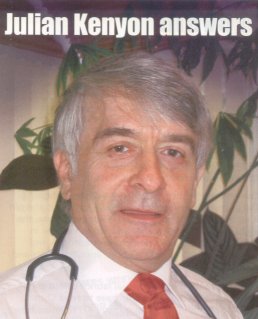Originally published in November-December 2004 icon

Dr Kenyon can also be reached directly, via www.doveclinic.com
Telephone: 020 7486 5588 or 01962 718 000
November & December 2004
Q:
I have recently had a mastectomy and chemotherapy for stage one breast cancer - no node involvement - followed by Arimidex. I am having severe side effects from Arimidex and the alternative Tamoxifen does not appeal to me at all. I would like to consult you about a programme of alternative medicine or be referred to another doctor who could assess my case.A:
Clearly your breast cancer is oestrogen receptor positive and you have been recommended Arimidex as an oestrogen antagonist. There is good research work backing this. However side effects to these drugs are more common that conventional doctors admit. The alternatives are to have a phyto-oestrogen, of which the soya derived ones, particularly genistein, would be worth considering. Another phyto-oestrogen, found in red clover , has been researched. Both show positive results without the side effects associated with Arimidex. Inevitably Arimidex, because it’s patentable and a drug, will be much more thoroughly researched than the natural alternatives which are non-patentable. You need proper advice in exactly how to manage this, and you need to know what the evidence base is for the natural approaches that might be recommended. Remember that because conventional treatment approaches are well-researched, it doesn’t mean that nothing else will work. That has to be a balance in the case of side effects such as the ones you have.
Q:
My mother has been diagnosed with Medullary cancer after surgery to remove the thyroid gland entirely. In July we were told it had spread to the liver and bones in her upper arms. We have been advised by the surgeon at our local hospital that there is nothing they can do for her after her six week course of radiotherapy. However, having been referred by the hospital, we are off to the Royal Marsden in London for a second opinion.As you can imagine we are keen to pursue any avenue that may give us hope of stabilising the cancer if not reducing it at this late stage. We are aware that it is supposed to be a slow growing cancer but (due to poor diagnosis by her GP) the cancer was not detected, we believe, for nine years. Mum is living by the Tree of Life book which has been of great help.
A:
Medullary cancer is a relatively rare form of thyroid cancer and it tends to have a worse outlook than the more common form of thyroid cancer which is called Papillary.
It may be worth you looking at alternative approaches. I have come across anecdotal cases of Medullary thyroid cancers being treated relatively successfully, but not cured, with high dose intravenous vitamin C as a means of trying to kill off tumour mass. Other supporting measures might be something to stop new blood vessel formation going to the tumour ( known as angiogenesis inhibition) and methods to stimulate her cell mediated immunity.
Maybe the second opinion you are taking in London at the Marsden Hospital will provide you with other possibilities that conventional oncologist can offer.
Q:
I am a 41 year old woman getting ready to start another chemo next week; the one I am currently taking has not worked so we need to try another. I originally had breast cancer but now also the lymph glands and the liver are affected. I am a little confused as to what to take during the chemotherapy. PS. Thanks for the help and inspiration offered by Chris Woollams’ books.
(Ed: for info on all his books or to place an order call 01280 815166 now!)
A:
The main downside of chemotherapy is that it reduces immune function. To this end I would use a medicinal mushroom preparation (Coriolus, Maitake or something similar) at a high dose. I would do this throughout the chemotherapy. I would also support your liver with a herbal liver remedy - milk thistle is commonly used. Also some gut bacteria replacement would help; there are a range of probiotic and acidophilus preparations available from many health food stores. Use a probiotic with a high number of organisms per gram to get the best results.
Lastly, if you can find somebody to advise you specifically for your individual case, look into an angiogenesis inhibitor. This is a preparation which reduces the amount of new blood vessel formation in tumours. The one we use is C-Statin, a low molecular weight extract of Convulvulus.
During chemotherapy I would not advise taking antioxidants. This is somewhat controversial, but chemotherapy is a pro-oxidant treatment trying to damage tumour cells. Therefore giving an antioxidant as well may compromise the activity of the chemotherapy. I hope you find this helpful.